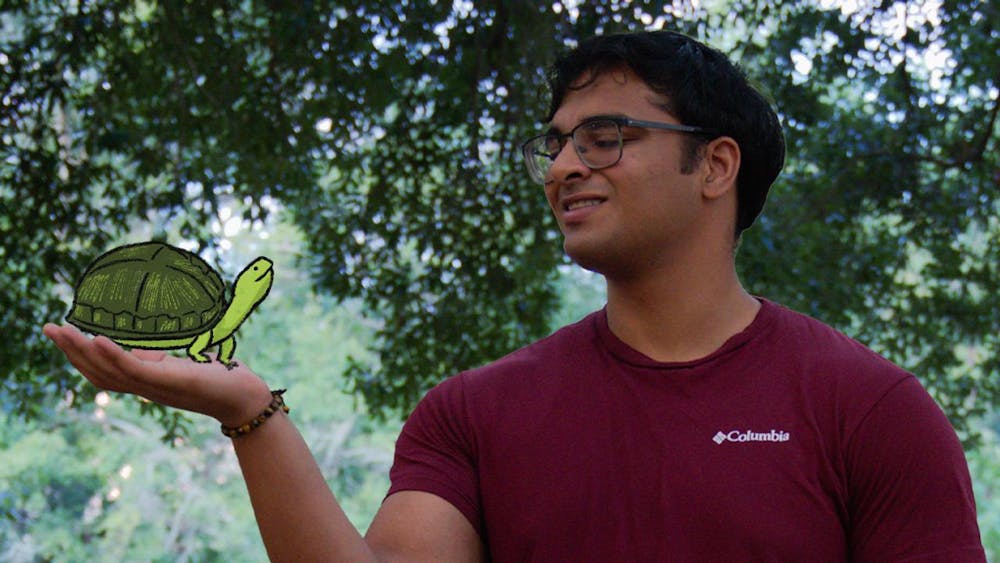How do we get people to care?
Dharmik Namineni, a sophomore at USC, has been asking himself the same question during his time as a volunteer at the Carolina Wildlife Center, a Columbia-based nonprofit organization that specializes in the rehabilitation of injured and orphaned wildlife native to South Carolina. The center's mission emphasizes protecting wildlife through education within the community.
Although Namineni is currently involved in the animal rehabilitation aspect, he hopes to gain experience as an educator for the center in the near future. Namineni enjoys volunteering and has a love for animals. When he came to college, he knew he wanted to get involved in some way.
“My first time there, just getting the tour and getting to see all of the native wildlife was super interesting. Getting to get involved and learn all about the treatments, getting to see the amount of animals that do need rehab or do need help at some point or another was just interesting to me,” Namineni said. “I didn’t realize there was such a need for a wildlife rehab center.”
Namineni began working in August 2024 and has devoted roughly 60 hours of service to the center. The Carolina Wildlife Center was founded in 1989 when it became apparent that there was a growing need for an organization dedicated to helping and rehabilitating animals.
“The idea with the rehabbing is that it’s as natural as possible, we don’t play with the animals, we don’t do anything crazy with them,” Namineni said.
He appreciates the educational component that the center is committed to, which includes community-facing events over the summer where participants have the opportunity to meet with “Animal Ambassadors” — animals that cannot be released due to various factors — and learn more about respecting the natural world.
Namineni believes that allowing the community to interact with the Animal Ambassadors encourages them to engage with the environment beneficially and understand the importance of their everyday actions in keeping these critters safe.
"Having something visual there, or having something they can actually engage with, is something that’s really powerful when you’re trying to educate someone," Namineni said.
Although rehabilitation is at the heart of the Carolina Wildlife Center’s mission, education is an equally important component — one that allows the center to distinguish itself.
“I think it's just such an interesting intersection between care and then education,” Namineni said. “And there's so few around South Carolina, just like generally anywhere. There's very few purely native wildlife centers.”
The Carolina Wildlife Center began with five individuals with a passion for songbird rehabilitation. Today, the organization relies on volunteers and paid staff to support the abundance of animals that come through their doors, helping anywhere from 3,500 to 5,000 animals each year.
Caring for a staggering number of animals in need of rehabilitation demands both attentiveness and strong organizational efforts. Executive Director Ashton Blume meets the challenge head-on by taking a hands-on approach that guides the center's success.
“My role is really involved in every single aspect of the center," Blume said. "I’m not a hands-on individual with the animal care on a daily basis, but I do go in and work physically in the center and do animal care so that I can stay in touch with our mission.”
By engaging with all aspects of the center’s daily functions, Blume ensures that the center’s mission is kept at the forefront, even as they face the fallout from growing environmental issues and anthropogenic change.
“Our goal is to conserve wildlife, protect wildlife, educate the public about the harm that humans are doing by encroaching on their spaces,” Blume said. “We exist because we have taken their habitats away, and so now we are trying to remedy that in any way possible.”
The Carolina Wildlife Center works hard to combat improper rehabilitation advice from outside sources in order to give the animals they treat the best shot of survival and normalcy. When animals have human interactions, they subsequently become more trusting of humans, which can ultimately be detrimental to their survival. To take the least disruptive approach possible in their rescue and rehabilitation process, the center follows certain rules.
“We do not talk to these animals like they are pets. We don’t baby-talk them. We have minimal interaction with them,” Blume said. “We even go as far as to wear certain different animal masks when we’re feeding certain animals because we don’t want to imprint on them.”
Providing this level of attentive, hands-on care requires a level of expertise, resources and dedication that does not come cheap. Unlike other organizations, the Carolina Wildlife Center does not receive federal funding and relies solely on public donations, as well as grants, excluding those from the state or federal level. The nonprofit relies on the kindness of people in the community for financial and volunteer support.
“We are a free service. We do ask for donations, because that’s the only way that we are able to stay operational and keep our doors open. But not only do we provide the service to the public, we rely on the public to also support our mission,” Blume said. “We are really dependent on people doing service work or community volunteers…I mean, without the public support it’s something we really couldn’t do.”
Contributions from students like Namineni ensure that the Carolina Wildlife Center can continue its mission of educating the public and rehabilitating wildlife. By raising awareness, the center can foster a deeper understanding of the delicate balance between animals and humans — and why protecting wildlife is a human issue. Blume urges everyone to consider the larger importance of animal rehabilitation.
“If all of those animals are no longer playing a role, if all of those animals cease to exist, the human population would not exist. We have to have them. They do not have to have us,” Blume said.



